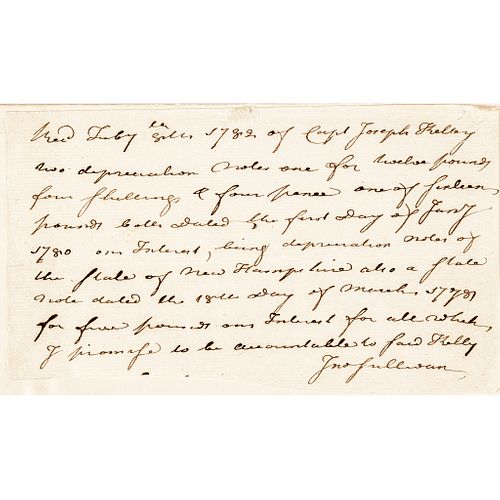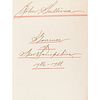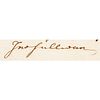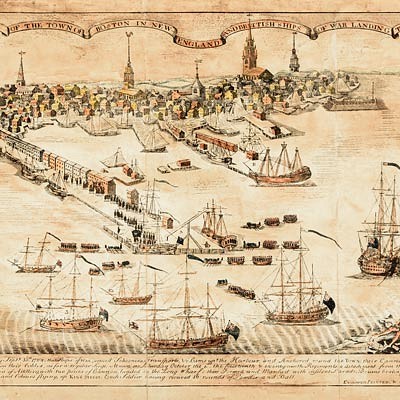1782 Major General JOHN SULLIVAN Accepts a Soldier's Depreciation Interest Notes
Lot 79
Categories
Estimate:
$1,200 - $1,800
Absentee vs Live bid
Two ways to bid:
- Leave a max absentee bid and the platform will bid on your behalf up to your maximum bid during the live auction.
- Bid live during the auction and your bids will be submitted real-time to the auctioneer.
Bid Increments
| Price | Bid Increment |
|---|---|
| $0 | $10 |
| $200 | $20 |
| $300 | $25 |
| $500 | $50 |
| $1,000 | $100 |
| $2,000 | $200 |
| $3,000 | $250 |
| $5,000 | $500 |
| $10,000 | $1,000 |
| $20,000 | $2,000 |
| $30,000 | $2,500 |
| $50,000 | $5,000 |
| $100,000 | $10,000 |
| $200,000 | $20,000 |
| $300,000 | $25,000 |
| $500,000 | $50,000 |
About Auction
By Early American History Auctions
Mar 20, 2021
Set Reminder
2021-03-20 12:00:00
2021-03-20 12:00:00
America/New_York
Bidsquare
Bidsquare : Autographs-Colonial-Political-Americana
https://www.bidsquare.com/auctions/early-american-history-auctions/autographs-colonial-political-americana-6509
330 Lots of Rare, Historic Autographs, Americana, Civil War Era, George Washington, Abraham Lincoln, Slavery & Black History, Revolutionary War Era, Colonial America, Federal Period, War of 1812, Colonial Currency, Indian Peace Medals & more... Early American History Auctions auctions@earlyamerican.com
330 Lots of Rare, Historic Autographs, Americana, Civil War Era, George Washington, Abraham Lincoln, Slavery & Black History, Revolutionary War Era, Colonial America, Federal Period, War of 1812, Colonial Currency, Indian Peace Medals & more... Early American History Auctions auctions@earlyamerican.com
- Lot Description
Autographs
1782 Revolutionary War Major General John Sullivan ADS Signed Receipt for a Soldier's Prior "Depreciation Notes" Due to the Payment of Loss in "Value" of his Continental Currency
Major General JOHN SULLIVAN, (1740-1795). American Revolution War Continental Army Major General under George Washington, captured at Long Island and exchanged, he later Wintered at Valley Forge, and was abandoned by D'Estaing to face the British at Newport, Delegate in the Continental Congress; 3rd Governor (or "President") of New Hampshire, and appointed by Washington as First United States Federal Judge for NH.
July 1782-Dated Revolutionary War Period, Autograph Document Signed, "Jno Sullivan", measuring 6.75" x 3.75", 1 page, tipped to larger 10.5" x 4.25" sheet for display, Choice Extremely Fine. This Document is regarding (Continental Currency) Paper Money Notes of Depreciation received from Captain Joseph Kelley (Joseph Kelly, Nottingham West, N.H. a Major of Colonel Sargent's Regiment). Very clean and fresh, well written and easily readable on laid period paper in John Sullivan's hand, his signature being vivid and clear, measuring 2.25" long at the conclusion. This Document reads, in full:
"Rec'd July 1st, 1782 of Capt Joseph Kelley two depreciation notes one for twelve pounds four shillings & four pence - one of Sixteen pounds - & other dated the first Day of January 1780 on Interest, being depreciation notes of the State of New Hampshire also a State note dated the 18th Day of March, 1778 for five pounds and Interest for all which, I promise to be accountable for Said Kelly -- (Signed) Jno Sullivan".
General Sullivan was apparently familiar with Captain Joseph Kelley, perhaps having been to the Tavern Kelley maintained pre-war in his home at "Kelley's Landing" at Nottingham West, New Hampshire. Kelley was also renowned to have a "hot head" and had actually broken out of jail in 1772. These "Depreciation Notes" were issued to Soldier's to help compensate with Interest for the rapid depreciation and loss in "value" of the Continental Congress' issued Paper Money Currency Notes, the depreciation of that currency during the year 1779 was more than five-fold, and where the purchasing power of one dollar at the beginning of the year had the purchasing power of twelve and one-half cents, and at the close of the War had fallen to a small fraction above Two Cents! In other words, where in January it required eight dollars to purchase the normal "value" in commodities and goods of one dollar, in the following December to purchase the same normal "value" of items it required $41.50.
Provenance: A note written on the tipped wove paper for display reads, in full: "John Sullivan. - Governor of New Hampshire. 1786-1788" and (acquired): "May 26, 1926"
John Sullivan (February 17, 1740 - January 23, 1795) was an Irish-American Major General in the Revolutionary War, a Delegate in the Continental Congress, Governor of New Hampshire and a United States District Judge of the United States District Court for the District of New Hampshire.
Sullivan, the third son of American settlers, served as a Major General in the Continental Army and as Governor (or "President") of New Hampshire. He commanded the Sullivan Expedition in 1779, having a "scorched earth" campaign against the Native American Indian Iroquois towns that had taken up arms against the American Revolutionaries. As a member of Congress, John Sullivan worked closely with the French Ambassador to the United States, the Chevalier de la Luzerne.
Our Auction Contents:
Black History & Slavery: (Lots 1 - 63)
Abraham Lincoln Related: (Lots 64 - 74)
Historic Autographs: (Lots 75 - 235)
Colonial America: (Lots 236 - 261)
Revolutionary War: (Lots 262 - 304)
George Washington Related: (Lots 305 - 306)
Early American Guns & Weapons: (Lots 307 - 318) - Shipping Info
-
Early American provides in-house worldwide shipping. Please contact us directly if you have questions about your specific shipping requirements.
-
- Buyer's Premium



 EUR
EUR CAD
CAD AUD
AUD GBP
GBP MXN
MXN HKD
HKD CNY
CNY MYR
MYR SEK
SEK SGD
SGD CHF
CHF THB
THB













